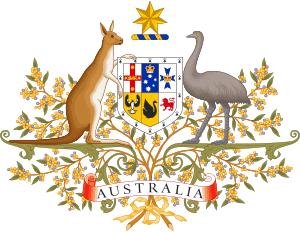Sex Discrimination Act 1984 facts for kids
Quick facts for kids Sex Discrimination Act 1984 |
|
|---|---|
 |
|
| Parliament of Australia | |
| An Act relating to discrimination on the ground of sex, sexual orientation, gender identity, intersex status, martial or relationship status, pregnancy, potential pregnancy, breastfeeding or family responsibilities |
The Sex Discrimination Act 1984 is a special law made by the Parliament of Australia. This law helps make sure everyone is treated fairly. It stops people from being treated badly because of their sex, or if they are married or in a relationship. It also covers if someone is pregnant or might become pregnant, or if they are breastfeeding. The law also helps people who have family duties.
This important law applies to many parts of public life. This includes places like work, schools, and when you buy things or use services. It also covers clubs and how government programs are run. If someone thinks this law has been broken, the Australian Human Rights Commission can look into it. There is also a special job called the Sex Discrimination Commissioner, which was created in 1984 to help with this law.
This law was first suggested and supported by Don Dunstan, who was the Premier of South Australia in 1975.
The Act helps Australia follow international agreements. One is the Convention on the Elimination of All Forms of Discrimination Against Women. This agreement aims to stop all unfair treatment against women. Australia agreed to this in 1983. The Act also follows parts of another agreement about workers with family duties. This is the International Labour Organization Convention 156.
Contents
How the Act Changed Things
The Sex Discrimination Act 1984 has led to many important changes in Australia. It has helped make things fairer for many people.
One big change happened in the Royal Australian Navy. In 1985, the Women's Royal Australian Naval Service (WRANS) joined fully with the main Navy. Before this Act, there were some rules that treated women differently. For example, married women could not serve until 1969. Also, pregnant women were automatically asked to leave until 1974. The Act helped remove these last differences.
Equal Marriage Age
In 1991, another law called the Sex Discrimination Amendment Act 1991 was passed. This law changed the Marriage Act 1961. It made the legal age for marriage the same for everyone: 18 years old. Before this, girls could get married at 16, while boys had to be 18. Now, everyone must be 18, unless there are very special reasons.
Protecting Pregnant Workers
The Sex Discrimination Amendment (Pregnancy and Work) Act 2003 was passed to help pregnant workers. This law made it clear what rights and duties pregnant people have at work. It helps make sure they are treated fairly in their jobs.
Fairness in Schools
In 2018, the Prime Minister at the time, Scott Morrison, said new laws would be made. These laws would help protect students from being unfairly expelled from religious schools. This protection would be for reasons related to who they are. Later, he also promised to protect teachers and staff in the same way.
Related Articles
 | Sharif Bey |
 | Hale Woodruff |
 | Richmond Barthé |
 | Purvis Young |

